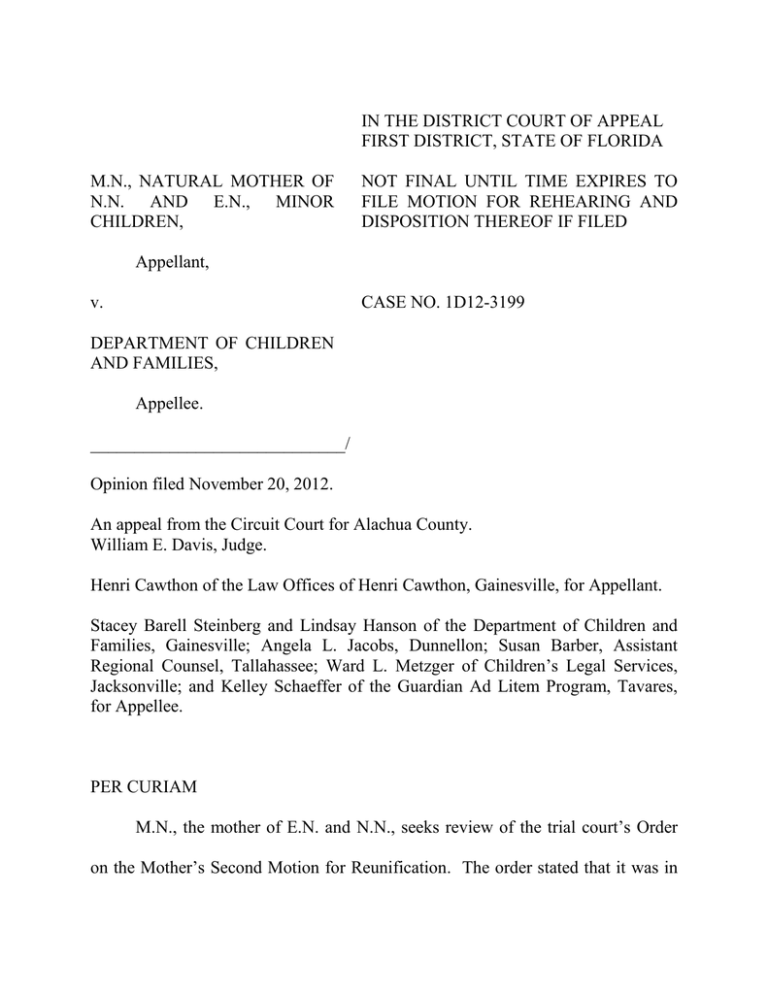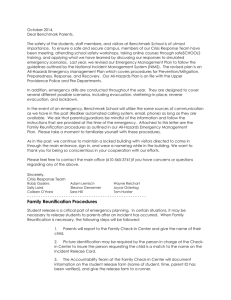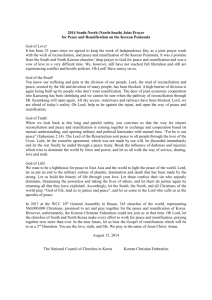MN, NATURAL MOTHER OF NN AND EN, MINOR
advertisement

IN THE DISTRICT COURT OF APPEAL FIRST DISTRICT, STATE OF FLORIDA M.N., NATURAL MOTHER OF N.N. AND E.N., MINOR CHILDREN, NOT FINAL UNTIL TIME EXPIRES TO FILE MOTION FOR REHEARING AND DISPOSITION THEREOF IF FILED Appellant, v. CASE NO. 1D12-3199 DEPARTMENT OF CHILDREN AND FAMILIES, Appellee. _____________________________/ Opinion filed November 20, 2012. An appeal from the Circuit Court for Alachua County. William E. Davis, Judge. Henri Cawthon of the Law Offices of Henri Cawthon, Gainesville, for Appellant. Stacey Barell Steinberg and Lindsay Hanson of the Department of Children and Families, Gainesville; Angela L. Jacobs, Dunnellon; Susan Barber, Assistant Regional Counsel, Tallahassee; Ward L. Metzger of Children’s Legal Services, Jacksonville; and Kelley Schaeffer of the Guardian Ad Litem Program, Tavares, for Appellee. PER CURIAM M.N., the mother of E.N. and N.N., seeks review of the trial court’s Order on the Mother’s Second Motion for Reunification. The order stated that it was in the children’s best interest to remain out of the mother’s home. The mother argues the trial court abused its discretion when it denied her request for reunification without finding competent, substantial evidence she was a danger to the children. The children were removed from the mother in December 2011 based on the following allegations: domestic violence by the father against mother, sexual abuse by the father against E.N., physical abuse by the father against the children, the mother’s untreated mental health issues, and the mother’s failure to protect the children from the father. The trial court adjudicated the children dependent and approved a case plan with a goal of reunification. Throughout the case, the guardian ad litem expressed various concerns about the mother’s alleged alcohol abuse and over-concerned parenting. In addition, the guardian ad litem reported the concerns of the children’s therapist, which included further allegations that the children were being “over-parented.” During the period of dependency, the mother abided by the case plan. She completed counseling, two psychological evaluations and a psychiatric evaluation, a behavioral health assessment, domestic violence counseling both with and without her children, a substance abuse assessment, and two parenting classes. Each of these assessments was largely positive regarding reunification. Despite the mother’s compliance with the case plan, at the evidentiary hearing on the mother’s second petition for reunification, the state and guardian ad 2 litem maintained their previous positions. The state expressed concerns about the mother’s alleged “fixation[s]” and that the mother was an “overly concerned mom.” The trial court appeared to accept that the mother was in compliance with her case plan by stating, “from what I’ve heard from all the parties and from what I’ve read, she has been doing what she was asked to do.” However, the court denied the petition because of its concern that reunification would not be in the children’s best interest. In the order denying the petition, the trial court found that reunification would not be in the best interest of the children due to the children’s therapist’s belief in the mother’s “scattered and frantic behavior.” In the order, the trial court made no mention of the mother’s substantial compliance with the case plan. Non-final orders preventing reunification warrant certiorari relief if a trial court abused its discretion. See S.P. v. Dep’t of Children & Family Servs., 17 So. 3d 878, 879 (Fla. 1st DCA 2009). Where a parent seeks reunification with a child, “the child must be returned to his or her parent if the parent has substantially complied with the case plan and ‘if the court is satisfied that reunification will not be detrimental to the child’s safety, well-being, and physical, mental, and emotional health.’” C.D. v. Dep’t of Children & Families, 974 So. 2d 495, 499 (Fla. 1st DCA 2008) (citing T.F. v. Dep’t of Children & Family Servs., 881 So. 2d 702, 702 (Fla. 1st DCA 2004)). 3 There are two factors a trial court must consider when ruling on a motion for reunification: the parent’s compliance with the case plan and whether reunification would be detrimental to the child. C.D., 974 So. 2d at 500. Section 39.522(2), Florida Statutes (2011), suggests that when a parent requests reunification and has substantially complied with the case plan there is a presumption of reunification. C.D., 974 So. 2d at 500. This presumption can be overcome if the trial court makes a finding supported by competent, substantial evidence that returning the child would endanger the child’s physical or emotional health. Id. Competent, substantial evidence is of the nature that a “reasonable mind would accept [it] as adequate to support a conclusion.” Id. (quoting Perdue v. TJ Palms Assocs., Ltd., 755 So. 2d 660, 665 (Fla. 4th DCA 1999)). In C.D., the trial court denied the mother’s petition for reunification because the guardian ad litem and children’s case worker expressed unsubstantiated concerns about the mother’s mental health and ability to care for the children. 974 So. 2d at 502. This Court held the evidence was not sufficiently supported by identifiable facts and could not be deemed competent substantial evidence. Id. In this case, the trial court was presented with evidence that the mother had substantially complied with the case plan, and the trial court appeared to accept that substantial compliance. Thus, there was a presumption of reunification. However, the trial court denied reunification based on the finding that returning the 4 children to the mother would endanger their physical and mental well-being. This finding was based solely on the report of the children’s therapist and the opinions of the guardian ad litem and the state. This evidence is similar to the evidence this Court rejected in C.D., and, under C.D., this evidence does not meet the competent substantial evidence standard. However, a subsequent ruling calls C.D.’s analysis into question. In S.P. v. Department of Children & Family Services, this Court found that a parent must show that the trial court’s findings of fact were, at a minimum, materially inadequate or incomplete or that the findings were a departure from the essential requirements of the law. 17 So. 3d at 881. Because there was no trial transcript in S.P., the parent could not show that the trial court’s findings of fact were a departure from the essential requirements of the law, and, as a result, this Court found the parent was not entitled to relief. Id. Because of this Court’s ruling in S.P., the mother must show that the trial court’s findings were materially inadequate or incomplete or that the findings were a departure from the essential requirements of the law. Unlike the father in S.P., the mother provided a full transcript of prior proceedings, which enabled this Court to determine the trial court’s findings departed from the essential requirements of the law requiring competent, substantial evidence to overcome the presumption of reunification that accompanies the substantial completion of the case plan. 5 Because the trial court’s findings departed from the essential requirements of the law, the trial court abused its discretion. Accordingly, we REVERSE and REMAND for proceedings consistent with this opinion. BENTON, C.J., DAVIS, and ROBERTS, JJ., CONCUR. 6


